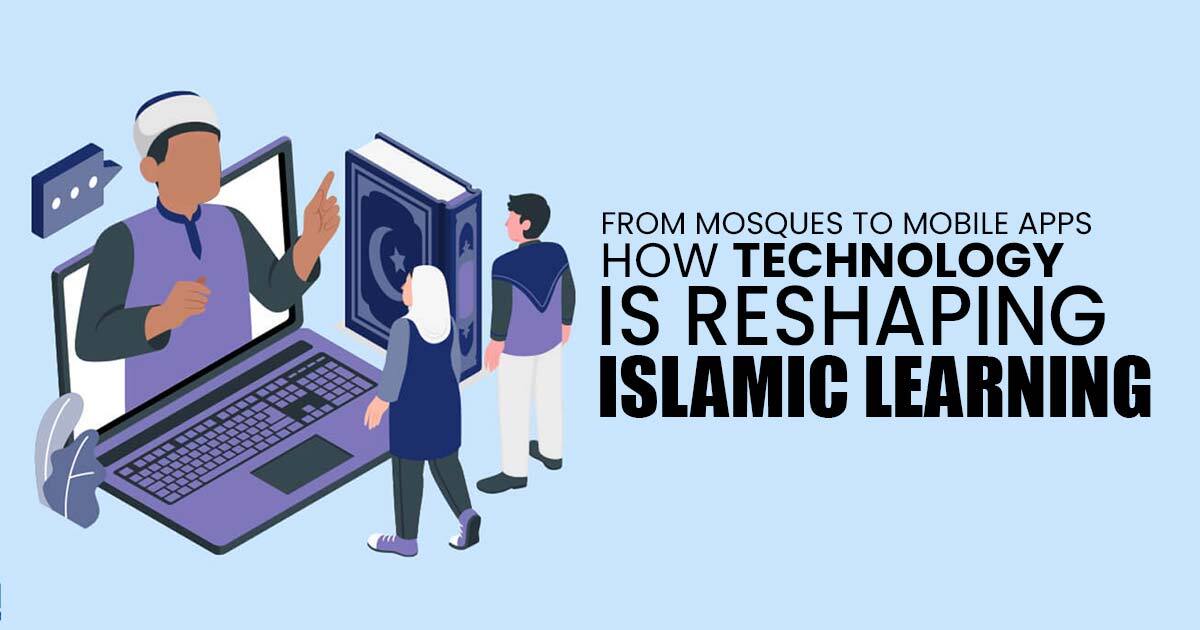For centuries, Islamic learning has thrived within the walls of mosques, guided by scholars and fueled by the shared experience of study groups. But the digital age has ushered in a new era, where mobile apps, online courses, and virtual communities are transforming how Muslims learn about their faith. This blog explores the exciting ways technology is reshaping Islamic education, making knowledge more accessible, engaging, and personalized than ever before.
The Traditional Landscape: Mosques as Centers of Learning
Mosques have long been the cornerstone of Islamic education. Imam Abu Hanifa, a renowned Islamic scholar, established the first recorded madrasa (Islamic school) within a mosque in the 8th century. These institutions offered a structured curriculum, with students learning subjects like Quranic recitation, Arabic language, Islamic jurisprudence, and history.
Key Features of Traditional Islamic Learning:
- Teacher-Centric Approach: Learning revolved around the knowledge and guidance of scholars, who interpreted religious texts and facilitated discussions.
- Community-Based Learning: Mosques fostered a sense of community, with students learning alongside each other and forming bonds through shared experiences.
- Emphasis on Memorization: Preserving and transmitting religious knowledge relied heavily on memorization techniques.
While traditional methods have served Islam well for centuries, the world is rapidly changing. Today’s learners have different needs and preferences.
The Rise of Technology: A Digital Revolution in Islamic Education
The proliferation of smartphones and the internet has opened doors to innovative ways of learning about Islam. Here’s how technology is reshaping the landscape:
- Mobile Apps: A plethora of Islamic learning apps cater to all ages and interests. Users can access Quran translations, listen to lectures by renowned scholars, and even take interactive quizzes to test their knowledge.
- Online Courses: Websites and platforms offer comprehensive online courses on various Islamic topics, from the basics of faith to advanced studies in Islamic law and theology. These courses often feature video lessons, downloadable resources, and online forums for discussion.
- Virtual Communities: Social media groups, online forums, and video conferencing platforms have created vibrant virtual communities where Muslims can connect with scholars, ask questions, and engage in discussions about their faith.
- Digital Libraries: Vast digital libraries have made access to Islamic texts and scholarly resources easier than ever. Users can search for specific topics, compare translations, and download books and articles for offline study.
Benefits of Technology-Aided Islamic Learning:
- Accessibility: Learning materials are readily available at any time and from anywhere. This is particularly beneficial for those living in remote areas or with busy schedules.
- Personalization: Learners can choose topics that interest them and progress at their own pace.
- Interactivity: Technology offers interactive elements like quizzes, discussions, and multimedia content, making learning more engaging.
- Standardization: Online courses and resources can ensure a more standardized level of Islamic knowledge across different communities.
Challenges and Considerations:
While technology offers tremendous benefits, it’s important to acknowledge the challenges:
- Quality Control: The sheer volume of online resources necessitates careful evaluation to ensure authenticity and accuracy.
- Digital Divide: Not everyone has equal access to technology or the internet, potentially exacerbating existing inequalities.
- Overreliance on Technology: Technology should supplement, not replace, traditional methods of learning from qualified scholars and within a community setting.
- Distraction and Information Overload: The digital world can be distracting, making it difficult to focus on deep learning.
Finding the Right Balance:
The key lies in finding the right balance between traditional and technological approaches. Mosques and Islamic centers can leverage technology to enhance their existing programs, while online learners can benefit from guidance from qualified scholars.
The Future of Islamic Learning: A Blended Approach:
Looking ahead, Islamic education will likely embrace a blended approach that combines the best of both worlds:
- Technology as a Tool: Technology will continue to evolve, offering even more innovative ways to learn about Islam.
- Importance of Human Connection: However, the importance of human connection and guidance from qualified scholars will remain paramount.
- Tailored Learning Experiences: Learning experiences will be increasingly tailored to individual needs and learning styles.
This blended approach has the potential to create a future where Islamic learning is accessible, engaging, and empowering for Muslims of all ages and backgrounds.
Conclusion:
Technology is undeniably transforming Islamic education. By embracing new tools and approaches while preserving the value of traditional methods, Muslims can create a dynamic and inclusive learning environment for generations to come. This blended approach has the potential to empower individuals, strengthen communities, and ensure the continued flourishing of Islamic knowledge in the digital age.
FAQs About Technology and Islamic Learning:
Is there anything risky about learning Islam online?
Yes, some information might be inaccurate. Stick to reputable sources from established Islamic institutions or qualified scholars.
How can I tell if online Islamic info is reliable?
Look for resources from well-known Islamic schools, universities, or recognized scholars. Check for reviews and see if the information aligns with other trusted sources.
Any tips for effective online Islamic learning?
Set goals, choose reliable resources, find a focused study space, engage with online communities for discussion, and consider supplementing online learning with guidance from local scholars.
Can parents use technology to help kids learn Islam?
Absolutely! There are educational Islamic apps and websites specifically designed for children. Use them alongside traditional methods like storytelling and mosque programs.
What’s the future role of mosques in Islamic education?
Mosques will remain crucial by providing a space for community learning, social connections, and offering guidance from qualified scholars. They can also integrate technology with computer labs, online lectures, and virtual learning communities.



